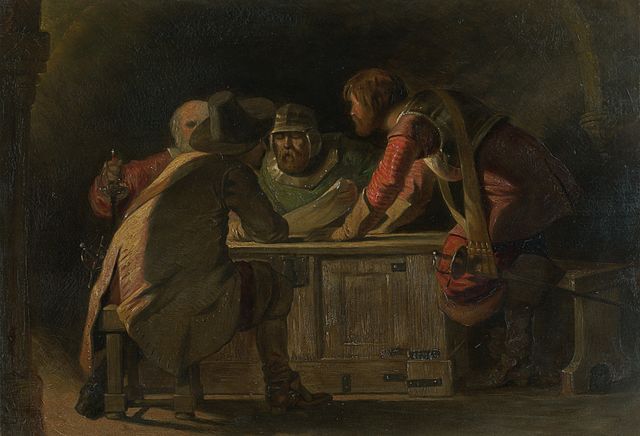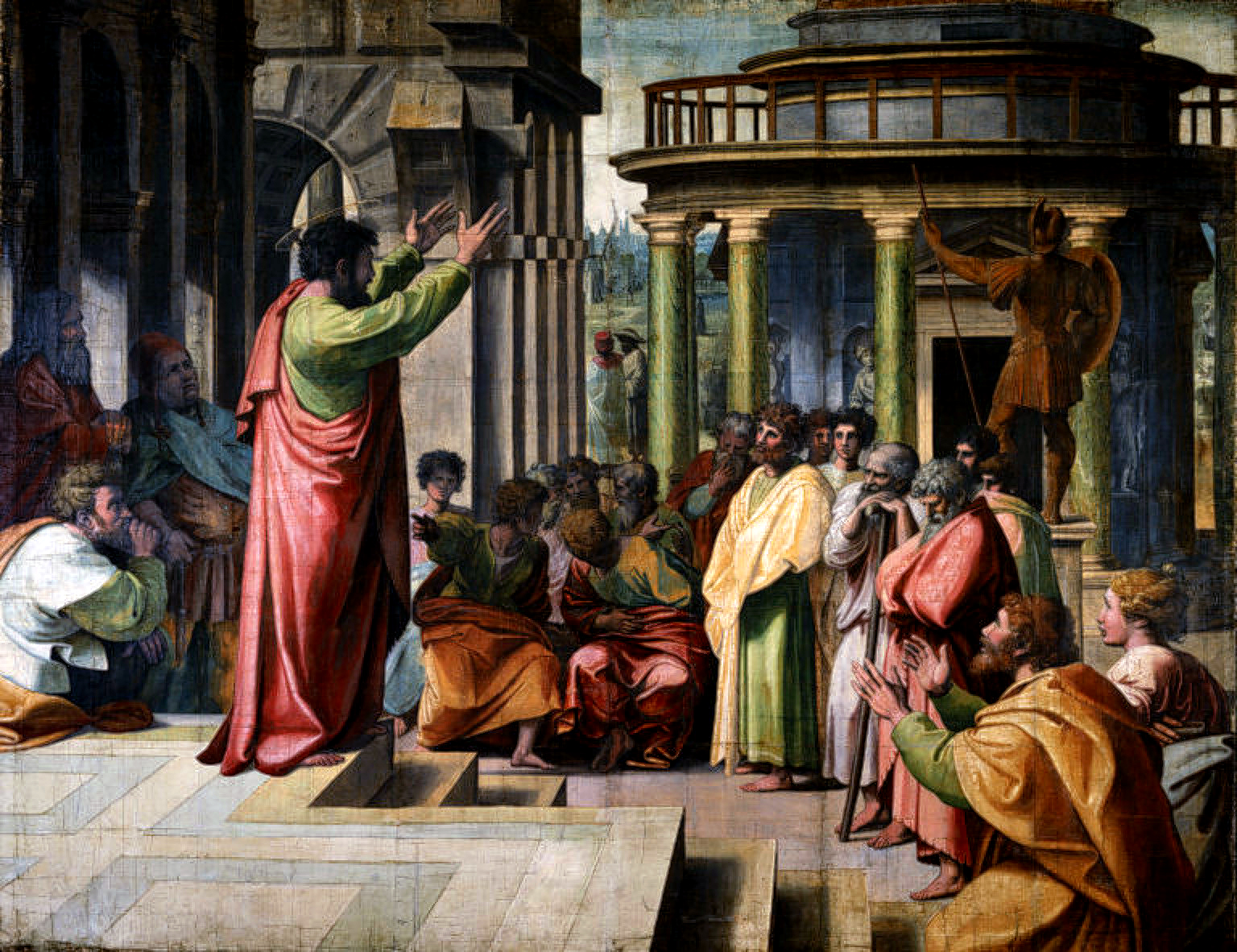Why We Know The Resurrection Wasn’t A Conspiracy
In my last article, I gave evidence for Jesus’ death, burial and appearances shortly after he died. But are there other explanations for what could have happened? Is it possible that Jesus’ followers plotted together to make it look like Jesus had came back from the dead? Did they conspire together as the basis of their rise to power? Or has Christianity’s explanation been the correct one all this time?
Possible vs. Reasonable
Before we delve into the theory, we have to distinguish between two different concepts – what is possible versus what is reasonable.
Anything is possible. It’s possible that I will get hit by an asteroid when I leave my house today. It’s possible that today someone will discover the cure for diabetes. It’s possible that we are all hallucinating everything and are really just disembodied brains plugged into some giant machine, generating thought power for our alien masters (hey…. that sounds like a plot for a good movie…).
These are all possible. But, they are not reasonable. We don’t live our daily lives based on what all is possible. If we did, we would never leave our homes. Sure, an asteroid may come streaking from the sky and hit me while I’m standing at the bus stop. But, based on what I know regarding the frequency of asteroids falling from the sky, I can safely go about my day, get on the bus, and go to work.
Possible vs reasonable is even more evident in the court of law. Juries aren’t asked to convict beyond a possible doubt. Not all questions will be answered. There will almost always be loose ends. But, given the evidence put in front of them, the jury has to determine if the conclusion being drawn by the prosecution is beyond a reasonable doubt. In other words, given the evidence before you, does this theory make the most sense? Not “does this theory dot every i and cross ever t”. But, is it the best explanation for the evidence we have. This is how we live our lives daily. Not what is possible, but what is reasonable.
Was Jesus’ Resurrection A Conspiracy?
Let me start off by admitting that before I found Christianity to be true, I believed that the men who started the church probably had some sort of agenda, and it wasn’t all good. Why did I think this? Because I grew up in the 80s and 90s, where the X-Files was one of my favorite T.V. shows, secret military bases like Area 51 and government cover ups over Roswell were really exciting to think about. I wasn’t a tin-foil hat wearing kind of kid, but I acknowledged that men with power seek to hold onto that power as well as gain more of it.
At the time, my impression of the early church fathers was that they were high society men of high education and political influence. So, of course they would have an agenda that wasn’t as clear as they would like us to think it was. Dan Brown pretty much confirmed my gut feeling in The Da Vinci Code. He based his plot on some things that are very difficult to verify, but are just believable enough that they could possibly be true.
What Makes A Good Conspiracy?
In his book Cold Case Christianity, former cold case homicide detective J. Warner Wallace outlines several key things that make a conspiracy more likely to succeed. First is the amount of people involved. The more people involved, the greater chance someone is going to crack and give up the lie, or turn everyone else in. The smaller the number of conspirators, the better. It’s simple math.
Next is the ability to maintain thorough and up to date communication. Being able to keep the story consistent is one of the biggest keys to pulling off the conspiracy. If one conspirator gets questioned, and he has the ability to tell another conspirator what he told the cops, they can keep their stories straight. This is why suspects are questioned in separate rooms individually; so they can’t hear the conversation going on between the investigators and their co-conspirators.
Another important element is time. The longer someone has to maintain a lie, the harder it is for that person to keep telling the same lie. If you tell a lie, and then someone asks you about it tomorrow, it’s pretty easy to keep the story the same. If they ask you about it in a year, you start to forget what you said and your story begins to change. The more time passes, the harder it becomes to keep track of the details of your lie.
We also have to consider the closeness of the relation between the conspirators. If one of your partners is just some guy you are doing a job with, you’re unlikely to risk your own skin for his. But, if it’s your brother, or mother, or life long friend, you’re more likely to “take one for the team” – even do hard time for them in prison to make sure they don’t have to.
Finally, we have to look at how much pressure the members of the conspiracy are under. If there is no pressure from investigation, then there is no reason to confess (unless your conscious gets the better of you). But, as investigation heats up, and the prospect of punishment becomes apparent, you start to reconsider if keeping up the lie is worth it. If you were an accessory to murder, you may be able to keep up the cover during investigation until the moment the cops say you could be sentenced to death. For something you didn’t actually do but covered up the lie regarding who did. Then you have a big decision to make,
Why Do People Commit Crimes?
Cops like Wallace will tell you that all motivations for committing a crime can be boiled down to 3 general reasons – greed, passion or power. People desire something (money, property, someone else’s possessions) and are willing to steal it from their owner; many times including murdering someone in the process. We’ve all heard about crimes of passion. Someone murders a cheating spouse and/or their flame. Someone murders someone else to keep them quiet. And, as for power, people are often driven to better their position in life by taking shortcuts at the expense of those around them. They want a better station in life and are willing to lie, cheat, steal and even murder to get ahead. Sometimes this is for a better job, sometimes is to have control over others.
The Christian Conspiracy
Many people attempt to explain the resurrection events as part of a conspiracy. The theory goes something like this. Jesus died on the cross; you can accept this fact for the conspiracy to work. This theory even accepts the fact that the tomb was empty. And, anyone going to look in the tomb would see that it was empty. But, this is where the conspiracy starts. In order to make it look like Jesus came back to life, his followers stole his body. Or, someone else did and they just played off of it. At any rate, they perpetuate the story that Jesus rose from the dead in order to further their agenda.
Is this theory a good one? Is it possible? Remember, we’ve already admitted that anything is possible. We need to think this through and see if it is reasonable. In order to be considered, it has to address the accepted facts; Jesus died on the cross, his tomb was found empty, his followers reported seeing him shortly after his death, and their lives were radically changed.
Addressing the first fact is easy; the theory accepts that Jesus died on the cross. After that, though, this theory start to develop a few issues.
The first issue is the empty tomb. In order to fake Jesus’ resurrection, his disciples would have had to have stolen the body from the tomb. This was not an uncommon thing to have arranged in ancient times. In order to elevate his status to god-like after he died, Alexander the Great made arrangements with his closest friends and followers to have his body removed from his tomb after he died. This was to “solidify” the claim that he was a god.
But, the Jewish high priests thought of this. Jesus had indeed been predicting his return, so they went to Pilate and asked for a guard to stand in front of the tomb and make sure this didn’t happen.
The next day, that is, after the day of Preparation, the chief priests and the Pharisees gathered before Pilate and said, “Sir, we remember how that impostor said, while he was still alive, ‘After three days I will rise.’ Therefore order the tomb to be made secure until the third day, lest his disciples go and steal him away and tell the people, ‘He has risen from the dead,’ and the last fraud will be worse than the first.” – Mathew 27:62-64 (ESV)
Pilate agreed, and sent a group of guards to seal and watch the tomb. Now, these aren’t like security guards you see at the mall. This is a group of 10-20 highly trained soldiers who would be put to death if they so much as nodded off while on duty. Nobody was getting past them. And, even if you did sneak past them somehow, you’d have to roll away the stone so quietly it didn’t wake anyone up.
There was no way a group of former fishermen, farmers and a tax collector could defeat a group of Roman guards. And, even if they did, you’d have a group of dead guards that needed explaining. Or, if the guards were just knocked out, you’d eventually have conscious guards to report that they had been attacked. Given all of this, I find it highly unlikely that anyone stole the body from the tomb.
Next, we have the reported appearances of Jesus after his resurrection. According to Paul, Jesus appeared to his disciples, to Paul himself, to James his brother, and to 500 more followers. Paul mentions the 500 to the Corinthians because he is wants them to go check out his claims if they want to. That’s a lot of people to be involved in keeping a secret. Wouldn’t it make more sense for Paul to keep the number to a much lower count? Even 10 people trying to keep a lie of such magnitude for the rest of their lives is a pretty tall order.
So why would Paul suggest that over 500 people had seen him? It would make more sense to say that only a select few (the supposed conspirators) had seen Jesus and you were just going to have to trust him on that. That sounds more like a conspiracy; not telling people there are 500 other people they can ask about it.
The final fact we have to address is the way the lives of Jesus’ followers changed so dramatically after they reported seeing him after his death. When Jesus was arrested and then sentenced to death, his apostles scurried and hid like rats. They were afraid. What could they possibly hope to gain by making up a story that Jesus had come back from the dead? What would their motive have been?
A Conspiracy Would Never Have Worked
Let’s look at our keys to a good conspiracy and see how they apply to the idea that the apostles stole the body and then started Christianity based on a lie. First off, there were too many people involved. Remember, the fewer people involved the better the chance of success. To get past the guards, move the stone, hide the body, and probably bribe a few people along the way would have taken multiple conspirators. They all would have had to have been in on it. And, the more people involved, the more chances you have of someone cracking and giving up the lie. So, the number of players makes this theory a shaky one.
Within a few years, the apostles started traveling all over the area. Some went to Egypt, some went to Turkey, some went to Rome, and one (Thomas) may have gone as far as what is now India. In order to keep the conspiracy going, they would have had to keep communication going over vast amounts of territory. There was no texting, no email, no telephones. Communication would have had to come on horseback or camelback. It would have taken months for a letter to get from Thomas in India to the church in Rome. There would have been too big of a time gap between when Rome sent the update and when Thomas got it. So, this too fails our test for a good conspiracy.
How about the test of time? The shorter a conspiracy has to be maintained, the better. The longer you have to maintain a lie, the more time you have to forget details, and the more your story changes. You have a longer time to slip up and get caught in a lie. Yet, the apostles maintained their story for over 40 years after they report seeing Jesus back from the dead. Most of them are dead by 70 A.D. The Apostle John lived until somewhere around 100 A.D. And he never changed his story for 70 years. That’s an awful long time to keep track of details of a lie and not get tripped up. The Christian conspiracy theory also fails the time test.
How about the closeness in connection to the conspirators. Some of the apostles were related, but to no more than two or three of the others. These men had only known each other for about 3 years. So, after Jesus’ death, these twelve men would have had to agree on a single story somehow. But, remember – the closer the bond with someone the more likely you are to stick with them. And what we have here are about 3-4 different groups of relatives and many who had no relatives. If one family wants to go one way, and another family wants to go another way, separate groups within the group are going to form up pretty quickly. There will be infighting – especially if your life is on the line. And, if you get caught, you are much more likely to turn on a non-relative than on a relative.
What about James, the brother of Jesus? He was a skeptic and not even a follower. Yet, he becomes one of the pillars of early Christianity and heads the church in Jerusalem. And what about Paul? He hated Christians in the beginning. What could possibly have convinced him to join in the conspiracy? Yet, every one of the apostles stuck together, With the same story. They were unified until their deaths. The only thing that keeps unrelated people unified even in the eyes of death is a story that is true, and not a made up lie. The Christian conspiracy also fails the tightness of relationship test.
The final test is the amount of pressure the apostles were under after the conspiracy would have formed. Almost immediately, Jesus’ followers were being hunted and persecuted. Before Paul became the most prolific writer of the New Testament, he was hunting Christians and taking part in their execution. So, you had to fear for your life if you wanted to count yourself one of Christ’s followers.
Most of the original twelve disciples ended up being killed for what they were saying. Most of them were either crucified, beheaded, stoned to death, tossed off of buildings, or speared. Most were also put in prison at one time or another. Yet, after all that, their story never changed. No one cracked. No one turned on anyone else. I think most of us would probably tell our captors what they wanted to hear just so they would stop torturing us. These men died still proclaiming Jesus Christ had risen. So this conspiracy tale most definitely fails the pressure test.
Now we come to what I feel like is the strongest blow against the conspiracy theory. That is the question of motive. What was the point? Why would these men concoct this story? What did they hope to gain?
Was it for money? We may think that now because we see ornate churches filled with golden relics. But, that didn’t come for another 600 years. Jesus taught them to live almost like beggars. If it was money they were after, they should have staid where they were in life. Matthew was a tax collector. Many were fishermen and had a steady source of income. Paul was destined for the good life, but gave that all up. Becoming a follower of Jesus meant to give that all up.
What about for sexual or relational desires? Some of the apostles were married. Some weren’t. And, of those that were, many of them reported giving up sexual relations with their wives to remain more focused on the mission at hand. One of the main messages of the Gospel is sexual purity and remaining faithful to one spouse. Not how to pick up the ladies.
What about power? It’s undeniable that a few hundred years later, and for much of the rest of Western history, the church can be linked with kings, queens, and men of power. This was where my mind went before I took the time to study what really happened. I thought that men of power with an agenda founded the church, and set down it’s doctrines.
Then I started reading the Bible and studying history, and I saw that what happened to these guys was the exact opposite. The apostles, and the early followers whom they preached to didn’t come into power. They had nothing to gain and everything to lose.
Paul is the perfect example of this. He was the Jewish Golden Boy; he had studied under the finest teachers, nobody knew the law like Paul, nobody practiced the law like Paul. He was destined for the high council. Yet, he gave that all up. For what? Prison, stoning, being chased out of town after town, and, ultimately, a beheading.
Christianity wasn’t the road to political power and social prominence when it first started. They were hunted and executed. One of Emperor Nero’s favorite pastimes was burning Christians to death. In the first couple centuries, Christianity wasn’t going to get you to any place of power in this life; it was likely to get you killed.
So, why did these men start teaching what they taught? Why did they give up a normal, safe life and risk everything to spread a message that would get them killed if they were caught? It wasn’t for money or power. They didn’t meet in secret and concoct a plot that would see them poor and hunted. It was because they knew the message they were preaching was true. Only the truth can keep so many people teaching the same unchanging story, over vast geographical areas, never changing, and willing to be martyred rather than recant.
The motivation behind their actions is clear. The apostles encountered the risen Jesus – just like they said they did – and preached the message he taught them until they died.
Share This Story, Choose Your Platform!
latest video
news via inbox
Nulla turp dis cursus. Integer liberos euismod pretium faucibua








Enjoyed this
Thanks, Janine!
This helped me understand the Resurrection and how the conspiracy is wrong.
HI David,
Glad it helped you!
Thanks for your comment